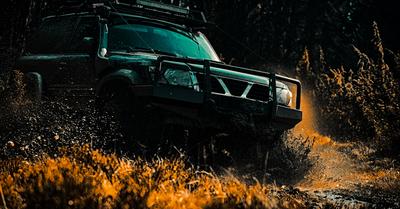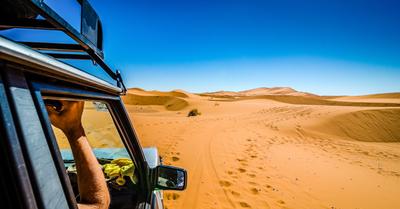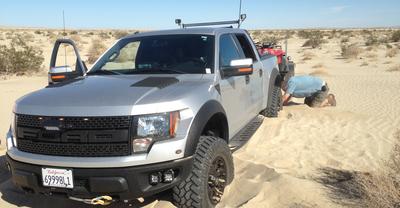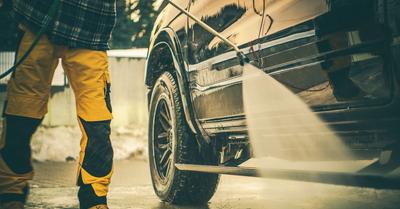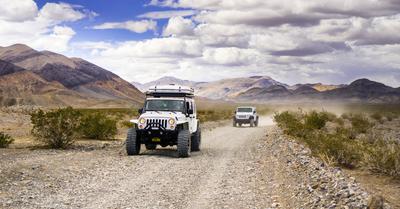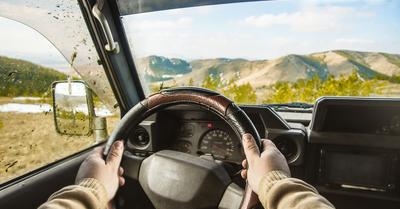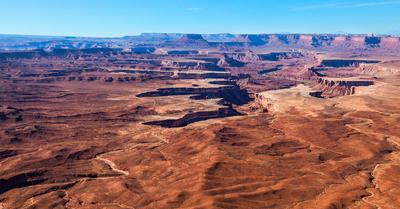Want to enhance your off-road experience? Our guide will show you how to select the best wheels for your vehicle.
To choose off-road wheels, the answer is simple: think about the size, material, and durability of the wheels, as well as the type of terrain you’ll be driving on. The wheel's design should also be considered, as it affects the overall performance and style of your vehicle.
Following my extensive years of experience in the off-road industry, I have helped countless drivers choose the perfect set of wheels for their vehicles or trucks. I’m passionate about off-roading and know what it takes to create an unforgettable experience. Here’s everything you need to know about choosing wheels that will give you the best performance and safety on rough terrains.
Key Takeaways
- Consider size; a larger wheel offers more ground clearance, perfect for rough terrain.
- Consider your frequent driving conditions and the type of terrain you plan to tackle.
- Choose a strong, durable wheel material to withstand gravel, dirt, and rough terrain.
- Steel wheels are heavier and more durable, while aluminum has better performance.
- Choose a reputable company because your wheel will be easily repaired if need be.
This article may contain affiliate links where we earn a commission from qualifying purchases.
Understanding Off-Road Wheels
When it comes to off-roading, having the right truck wheels can make all the difference. In this section, we'll go over what off-road wheels are, why you should choose them, and the differences between off-road and on-road wheels.
What are Off-Road Wheels?
Off-road wheels are designed to handle the harsh terrain that comes with off-roading. They are typically forged alloy wheels or steel wheels, which makes them stronger and more durable than their on-road counterparts.
Off-road wheels also feature larger diameters and wider widths, which helps provide better traction and stability on uneven surfaces.
Why Choose Off-Road Wheels?
Choosing off-road wheels can greatly improve your off-road ride experience. Off-road wheels are designed to handle the tough terrain that comes with off-roading, which means they can help prevent damage to your vehicle. They also provide more traction and stability, which can help you navigate difficult terrain with ease and improve your ride quality.
How to Choose Off-Road Wheels: Factors You Should Consider
When choosing your wheels, there are several factors you need to consider to ensure you get the best wheels that can handle the terrain you plan to tackle. Here are some of the factors you need to keep in mind:
Wheel Sizes
The size of your off-road wheels is an important consideration. Larger wheels tend to perform better off-road than smaller-diameter wheels.
However, larger wheels can also be heavier, which can negatively impact your vehicle's performance. You need to choose a size that is appropriate for your vehicle and the terrain you plan to tackle.
Offset and Backspacing
Offset and backspacing are important factors to consider when buying wheels for your off-road world. Offset refers to the distance between the centerline of the wheel and the mounting surface.
Backspacing, on the other hand, is the distance between the mounting surface and the back edge of the wheel. These two factors affect the position of the wheel on your vehicle and can impact its performance.
Bolt Patterns
Bolt patterns refer to the number of bolts on the wheel and the distance between them. You should choose a wheel with a bolt pattern that matches your vehicle. This ensures that the wheels fit properly and are securely mounted.
Wheel Material
Off-road wheels are typically made from either steel or aluminum. Steel wheels are heavier but tend to be more durable and can handle more abuse.
Aluminum wheels are lighter and tend to provide better performance, but they are also more expensive.
Wheel Diameter
Wheel diameter refers to the size of the wheel, measured in inches. Off-road wheels typically come in 15, 16, or 17-inch diameters. You need to choose a wheel diameter that is appropriate for your vehicle and the terrain you plan to tackle.
Load Rating
The load rating of your off-road wheels is an important consideration. The load rating refers to the maximum weight that the wheel can support.
You need to choose a wheel with a load rating that is appropriate for your vehicle and the weight of any gear you plan to carry. Having more load than required can make your vehicle unstable on the road.
Types of Off-Road Wheels and What They’re Best For
When it comes to choosing off-road wheels, each type has its advantages and disadvantages, so choosing the one that best fits your needs is important.
Here’s a summary of the most common off-road wheels:
Steel Wheels
Steel wheels are a popular choice for off-roading because they are strong and durable. They’re also relatively inexpensive, which makes them a great option if you’re on a budget. They’re also easy to repair if damaged, saving you money in the long run.
However, steel wheels are heavier than other types of off-road wheels, which can affect your vehicle’s performance. They can also rust over time, which can be unsightly and reduce their lifespan.
Cast Aluminum Wheels
Cast aluminum wheels are another popular choice for off-roading. They are lighter than steel wheels, which can improve your vehicle’s performance. They’re also more resistant to rust and corrosion than steel wheels, which can make them a better long-term investment.
However, cast aluminum wheels are more expensive than steel wheels, which can be a drawback if you’re on a tight budget. They are also more prone to cracking and bending than steel wheels, which can be a problem if you’re doing serious off-roading.
Beadlock Wheels
Beadlock wheels are a type of off-road wheel that is designed to keep the tire bead securely attached to the wheel rim, even in extreme off-road conditions.
Beadlock wheels are particularly useful for rock crawling, extreme off-roading, and other situations where the tire is subjected to extreme lateral forces, such as when traversing steep inclines or declines.
They provide a more secure and reliable connection between the tire and the wheel, which can help prevent tire damage or failure and improve off-road performance. However, it's important to note that beadlock wheels require more maintenance and care than traditional wheels.
Forged Aluminum Wheels
Forged aluminum wheels are the strongest and lightest type of off-road wheel. They are made by heating a solid piece of aluminum and then shaping it using a forging press. This process creates a wheel that is incredibly strong and durable.
Forged aluminum wheels are also the most expensive type of off-road wheel. However, if you’re serious about off-roading, they are a worthwhile investment. They are also more resistant to cracking and bending than cast aluminum wheels, which can be a big advantage if you’re doing serious off-roading.
How to Choose the Right Wheel Size for Your Off-Road Vehicle
Choosing the right wheel size is crucial for off-road driving. The size of your wheels affects your vehicle's performance, handling, and overall look. Here are some tips to help you choose the right wheel size for your off-road vehicle.
Consider Your Vehicle's Tire Size
Your vehicle's tire size is an essential factor to consider when choosing the right wheel size. You can find your tire size on the sidewall of your tires. You need to match the diameter of your wheel to the size tire.
For example, if your tire size is 33x12.50R15, you need a 15-inch diameter wheel.
Choose the Right Width
The width of your wheel affects your tire's contact patch. A wider wheel provides a larger contact patch, which improves traction.
However, a wider wheel can also affect your vehicle's handling and cause rubbing. You need to choose the right width for your vehicle and tire size. You can find the recommended wheel width in your tire manufacturer's specifications.
Know Your Bolt Pattern
Your vehicle's bolt pattern is the number of bolts on your wheel and the distance between them. You need to choose a wheel with the same bolt pattern as your vehicle. If you choose a wheel with a different bolt pattern, it will not fit on your vehicle.
Choose the Right Material
Off-road wheels come in different materials, including steel, cast aluminum, and forged aluminum. Steel wheels are durable and affordable but heavy.
Cast aluminum wheels are lighter than steel wheels and come in different designs. Forged aluminum wheels have a lightweight nature but are also the strongest and most expensive. Choose the right material based on your budget and driving needs.
Terrain-Specific Off-Road Wheels
When it comes to off-road driving, the type of terrain you will be driving on plays a significant role in determining the best wheels for your vehicle.
Different terrains require different types of wheels to ensure optimal performance and safety. In this section, we'll take a closer look at the different types of terrain-specific off-road wheels you should consider.
Sand Wheels
If you plan to drive on sandy terrain, you'll need a wheel to handle the soft surface. Sand wheels are designed with a wider diameter and a lower offset.
This design helps to distribute the weight of your vehicle over a larger surface area, preventing it from sinking into the sand. Additionally, sand wheels typically have a paddle-like tread pattern that helps to provide traction in the loose sand.
Gravel Wheels
Gravel is a common off-road terrain requiring a specific wheel type. Gravel wheels are designed with a smaller diameter and a higher offset.
This design helps to provide better handling on the loose gravel surface. Additionally, gravel wheels typically have a more aggressive tread pattern that helps to provide better traction on uneven surfaces.
Mud Wheels
If you plan on driving through muddy terrain, you'll need a wheel that can handle the slick surface.
Mud wheels are designed with a wider diameter and a lower offset. This design helps to prevent the wheel from sinking into the mud. Additionally, mud wheels typically have a deep, wide tread pattern that helps to provide better traction in slippery mud.
Rock Wheels
Rocky terrain requires a specific type of wheel that can handle the sharp, jagged edges of the rocks. Rock wheels are designed with a smaller diameter and a higher offset.
This design helps to provide better clearance for your vehicle, preventing it from getting caught on the rocks. Additionally, rock wheels typically have a tough, corrosion-resistant, and durable construction that can withstand rough terrain.


